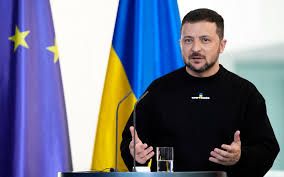Zelensky Cuts Short Landmark South Africa Trip Following Deadly Russian Strike on Kyiv

Ukrainian President Volodymyr Zelensky has abruptly ended his historic visit to South Africa following a devastating overnight missile and drone assault on Kyiv that left at least nine dead and over 80 injured, including children.
The attack, one of the deadliest in recent weeks, forced the Ukrainian leader to cancel the remainder of his diplomatic engagements and return to Kyiv “immediately,” he confirmed in a post on X (formerly Twitter).
He had just concluded high-level talks with South African President Cyril Ramaphosa as part of a strategic push to deepen ties with African nations and counter Russia’s growing influence on the continent.
“There is significant destruction. Rescue operations are ongoing,” Zelensky stated. “It has now been 44 days since Ukraine upheld a full ceasefire in accordance with the March agreement brokered with the United States. These strikes must stop—immediately and unconditionally.”
The timing of the attack underscores the increasingly fragile nature of the ceasefire arrangement and highlights Ukraine’s pressing security challenges, even as it seeks to broaden its diplomatic reach beyond traditional Western allies.
Zelensky’s trip to South Africa represented a major diplomatic milestone—his first official visit to the continent’s most influential economy. Just two years ago, such a visit seemed out of reach.
In 2023, President Ramaphosa led an African delegation to Kyiv on a self-styled peace mission, despite South Africa’s refusal at the time to openly condemn Russia’s invasion of Ukraine—an issue that strained bilateral relations.
But recent shifts in global alliances appear to have created new opportunities for both nations. Increasingly disillusioned with Washington, both Kyiv and Pretoria are now navigating more independent foreign policy paths.
South Africa, having had its U.S. ambassador expelled and key aid programs suspended, has embraced a more non-aligned role, which it claims positions it as a potential peace broker between Russia and Ukraine.
Meanwhile, tensions are mounting in Washington. Former President Donald Trump, recently re-elected in a stunning political comeback, accused Zelensky of undermining peace talks after the Ukrainian leader reaffirmed that Kyiv would never accept Russian sovereignty over Crimea—a peninsula annexed by Moscow in 2014 in violation of international law.
Trump insisted that peace was “very close,” blaming Zelensky’s stance for prolonging the conflict. U.S. Vice President JD Vance elaborated on the proposed deal, hinting at a controversial “freezing” of current frontlines. “Both sides will have to make concessions,” he said, without clarifying what Ukraine would be expected to surrender.
Recognizing Russia’s control of Crimea would not only contradict international legal norms that prohibit territorial changes by force but would also be politically untenable for the Ukrainian leadership, whose position on the peninsula remains resolute.
Zelensky’s shortened visit may have been cut short by tragedy, but it signals a new chapter in Ukraine’s global diplomacy. With the landscape of international alliances shifting and U.S. support no longer guaranteed, Ukraine is increasingly looking to the Global South—not just for sympathy, but for strategic partnerships.
For Kyiv, South Africa’s balancing act between East and West might yet become a bridge to wider support—and perhaps, a path to a more just peace.





